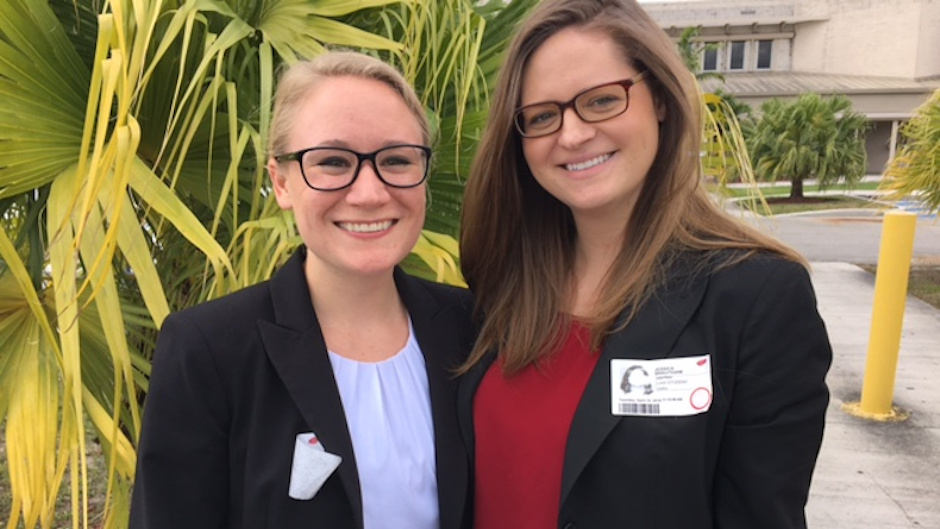In a contentious hearing that tested their litigation skills, Immigration Clinic students Claire Howe, who recently graduated, and 2L Jessica Brautigam, won the immigration court case of an undocumented bisexual Jamaican woman in her early twenties.
Brought to the United States as a young child, the Clinic’s client graduated from high school and attended college until she could no longer afford the tuition. She sought protection from deportation to Jamaica, a country known for violence against members of the LGBT community. Under U.S. immigration law, immigrants who fear persecution or torture in their home country can file for asylum, withholding of removal, or relief under the Convention Against Torture.
“Being in immigration court without an attorney is one of the worst feelings a person can experience,” said the Clinic’s client. “But the Immigration Clinic, especially Claire Howe and Jessica Brautigam, came to my rescue. They did an amazing job and were very dedicated. I am very grateful for having them represent me.”
Howe met the client when Clinic students went to Glades County Detention Center to conduct know-your-rights presentations to men and women detained by immigration authorities. “Meeting our client at Glades at the know-your-rights presentation was one of the most significant moments of my experience working with the Clinic,” said Howe. “After learning her story, I felt compelled to help. Here was a woman who had come to the United States at a very young age, graduated high school and had gone on to college, yet was facing removal to a country she barely remembered and that would likely persecute her for who she is.”
Despite uncontroverted proof that the Clinic’s client is bisexual, both the judge and the immigration prosecutor were initially skeptical of the client’s claim. But Brautigam and Howe persevered, convincing the judge to grant the case and the government to not file an appeal.
Reflecting on her experience in court, Brautigam said, “Trying to prove someone’s sexual orientation opened my eyes to the near insurmountable barriers our immigration detention system has created for detainees who lack legal representation. Had our client not had representation, she would likely have lost her case simply because she would not have had a way to prove her claim to the judge.”
On numerous occasions over the course of the semester, Brautigam and Howe drove two hours each way to Glades Detention Center to meet with their client. Glades is a medium security county jail that detains immigrants for the federal government. Detainees are held in large pods without natural light and given one hour of time outside a day. As a remote jail, Glades detainees have poor access to lawyers, and jail officials refuse to permit confidential phone calls between detained immigrants and their lawyers. The Clinic has called for the federal government not to renew its contract with Glades
“The situation at Glades calls out for redress,” said Clinic Director Rebecca Sharpless. “We have found people with mental health conditions locked away in solitary confinement and heard reports of excessive physical force and pepper spray.”
In the Immigration Clinic, students represent indigent clients in court and work on collaborative projects aimed at advancing the rights and dignity of immigrants. The Clinic has prevailed in other deportation cases to Kenya and Jamaica related to fear of abuse based on sexual orientation.
Students apply for Clinics in the spring semester for the following academic year. Students interested in applying for a Miami Law clinic should visit the webpage of the Clinical Program.

